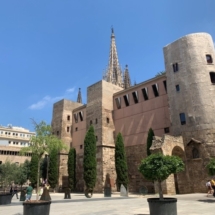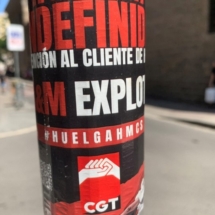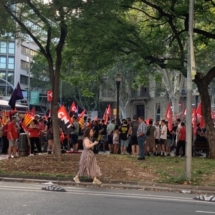A historical trip to Barcelona

Barcelona Cathedral
Old Members’ Trust Undergraduate Conference and Academic Travel Fund blog – Jonathan McDowell (2022, History)
Thanks to generous funding from the trustees of the Old Members’ Trust Undergraduate Conference and Academic Travel Fund, I was able to take a five-day trip to Barcelona in July 2024 to access archival material on the oral history of the Spanish Civil War. L´Arxiu Històric de la Ciutat de Barcelona, the city archive, seemingly holds the only transcripts of approximately three hundred interviews with Civil War contemporaries conducted by Ronald Fraser, British historian, author and early pioneer of oral history as a distinct discipline within the wider study of history.
These interviews, which are likely to act as a primary source for my undergraduate thesis researching Spanish anarchism, proved as enlightening as I had hoped upon first learning of their existence, exploring in detail the intricacies of the revolutionary upheaval experienced across Spain following the attempted coup d’etat led by, among others, future Caudillo and fascist dictator Francisco Franco.
Also enlightening was the city of Barcelona itself – walking its streets and seeing the daily lives of its residents brought insights into the events of the 1930s no written text could. Plastered on lamp-posts and walls across the city were stickers and posters, almost universally advocating for solidarity or membership in the more left-leaning of Spain’s trade unions, most notably the Unión General de Trabajadores(UGT) and Confederación Nacional del Trabajo(CNT). The CNT in particular had taken a leading role in pushing forward the revolutionary process in Barcelona itself, and across Catalonia more widely, so to see the union still active and still campaigning in the city despite decades of repression under Franco demonstrated to me, if not a lingering attachment to the union and its agenda, then perhaps a latent revolutionary sentiment possessed by the city’s population.
Indeed, in a further demonstration of this point, I happened upon a CNT protest march as I walked the city streets past the Plaça d’Urquinaona. Within an hour, the march numbered several hundred people, filling the streets they walked down for some distance.
In Barceloneta, historically among the city’s more working-class areas, there was little evidence of the kind of right-leaning populism becoming so prevalent across Europe and indeed, arguably, the UK. Instead, posters for the Catalan ‘Living Unified Socialist Party’ and other further-left currents were more frequent, and the Estelada, the flag adopted by the Catalan independence movement, hanging from balcony after balcony. The root causes of the city’s revolutionary turn and desire for greater autonomy from central government control, therefore, while at their most prevalent in the Civil War, appear very much alive to this day.
I am extremely grateful to have had the opportunity to visit Barcelona to do this research – aside from there being no digitised or other copies of these valuable transcripts held elsewhere, immersing myself in the day-to-day life of the city has demonstrated why revolutionary sentiments held such great sway with Catalans then, and why those echoing these sentiments today hold sway even now.
Published: 17 September 2024





